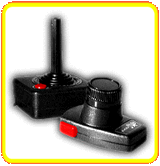|

The
VCS was conceived in 1976 by Joe Decuir, who designed the
chip set and the first prototypes; Harold Lee, who had
pushed Nolan Bushnell in the direction of consumer electronics
with home Pong; and Steve Meyer, who figured out how to
make the VCS cost effective.
It
was based around the 6507 micro-processor, had 4k of ROM max and
128 bytes of RAM to keep track of scores etc. It had three sound
channels that it put out in glorious mono. Its CPU clock speed
was 1.19 MHz (the same units as in "a Pentium233 runs at 233 MHz").

The
VCS was a great product but Atari didn't have the money to perfect
and manufacture it. They would have to merge with a big entertainment
company to do this. Eventually Warner Communications executive
vice president Manny Gerard made his first acquisition
for the company. Gerard later said he saw the VCS in an Atari
lab and said, "Holy Shit! This
is going to take over the world".
With
the blessing of Warner boss Steve Ross Atari was bought
for $28 million (see Nolan Bushnell article in RETROGAMER 1).
400,000
VCS's were produced and the VCS went on sale in American shops
in November 1977 for $200. Although it was an impressive piece
of kit it encountered market apathy. Most people had played Pong
for six months and then got bored.

This
was their image of a TV video game. Atari produced versions of
most of their arcade back catalogue for the console. Part of the
Combat cart was the arcade game Tank (I love it's option for steerable
bullets - reality goes straight out the window). Breakout was
given it's first home version, quite a slick game for it's day.
The
simple two player shooter Outlaw with its blocky graphics
appeared and the earliest of video games Space War also
received an outing. VCS Chess blanked the whole screen
(sometimes for hours) while it thought of its next move.
The
driving game Night Driver used the paddle controllers to
good effect. These were colourful and competent versions but they
needed the equivalent of a hit to make their product mainstream.
They needed this impetus to create excitement to bring video games
to the masses. And that, incredibly is what they got.
|

